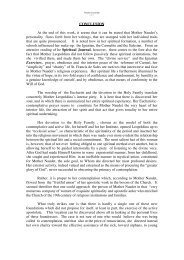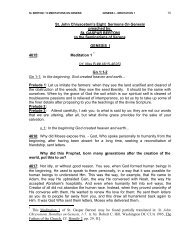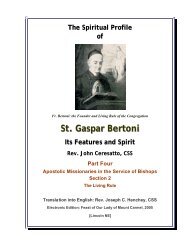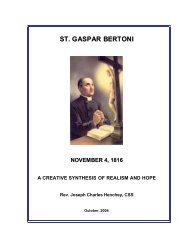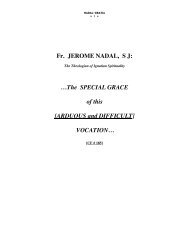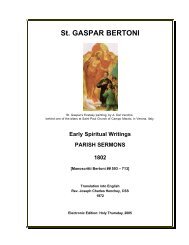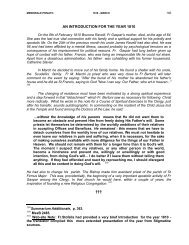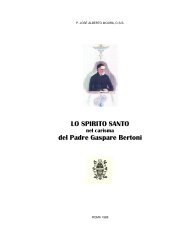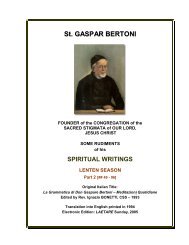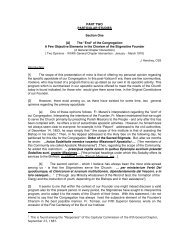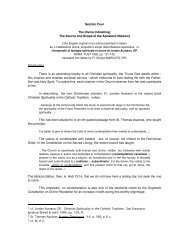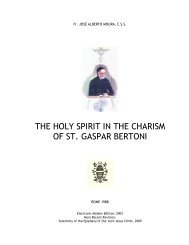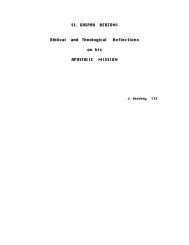[B.] St. IGNATIUS of LOYOLA Presentation: The ... - St. Gaspar Bertoni
[B.] St. IGNATIUS of LOYOLA Presentation: The ... - St. Gaspar Bertoni
[B.] St. IGNATIUS of LOYOLA Presentation: The ... - St. Gaspar Bertoni
Create successful ePaper yourself
Turn your PDF publications into a flip-book with our unique Google optimized e-Paper software.
INTEGRE;SJ-OFM<br />
= 20 =<br />
|1| <strong>The</strong>re is some surprise for<br />
commentators when they note Ignatius’ pre-ordination <strong>of</strong> his freedom, with respect to the three<br />
potencies <strong>of</strong> the soul: memory, understanding, will. This oblation is the reflection <strong>of</strong> the double<br />
reciprocal movement which defines love. <strong>The</strong> Lord, Who has made <strong>of</strong> me the object <strong>of</strong> His<br />
election, now seeks to receive me in the intimacy <strong>of</strong> His life.<br />
|2| This is a matter <strong>of</strong> handing over<br />
that objective dominion upon which my freedom holds sway and the union <strong>of</strong> this with God - And<br />
when everything is subjected to him, then the Son Himself will be the subject in His turn to the<br />
One who subjected all things to him, so that God may be all in all [cf. 1 Co 15:28]. <strong>St</strong>. Ignatius<br />
does this not so much out <strong>of</strong> any duty, but simply out <strong>of</strong> love. <strong>The</strong> Lord has given him all, and thus<br />
he returns it with a reciprocity which includes all, that God is all in all.<br />
|3| This prayer <strong>of</strong> the Suscipe is<br />
that expression <strong>of</strong> <strong>St</strong>. Ignatius’ life: this is his “existential theology”, the root, the synthesis <strong>of</strong> all<br />
the rest that he tried to do. He hands over his memory. his understanding, and his entire will. This<br />
image <strong>of</strong> the Trinity is to respond to the very life <strong>of</strong> God Father, son and Holy Spirit: intellect, will,<br />
memory. On the soul is taken over with such love <strong>of</strong> self-giving it is raised up by the spirit <strong>of</strong> God<br />
and by His grace and placed into contact, according to the three potencies <strong>of</strong> the soul with the<br />
Father, Son and Holy Spirit.<br />
|4| <strong>St</strong>. <strong>Gaspar</strong> <strong>Bertoni</strong>, on May<br />
24, 1810 7 presents in his Spiritual Diary, a prayer apparently <strong>of</strong> the deMontfort spirit, in honor <strong>of</strong><br />
Mary, but close, as well, to this spirit <strong>of</strong> <strong>St</strong>. Ignatius:<br />
“I greet you, o my Mother, give me your blessing, bless me and all who are dear to me.<br />
Please <strong>of</strong>fer to God all have to do and suffer today, in union with your merits, as well as<br />
those <strong>of</strong> your Blessed son. I <strong>of</strong>fer you and consecrate to your service, all my being, and<br />
whatever belongs to me placing everything under your protection. Obtain for me, my dear<br />
Lady, purity <strong>of</strong> soul and body and grant that I may not do anything today displeasing to<br />
God. I entreat you through your Immaculate Conception and your perfect Virginity.”<br />
|b| Love consists in communication on<br />
various levels; a likeness in nature, and a wishing the other well. Reciprocity is the indication <strong>of</strong><br />
the quality <strong>of</strong> the human sentiments and the measure <strong>of</strong> love. If appreciation is the bond that<br />
brings together those <strong>of</strong> unequal status, the Love, in exchange, that proceeding from God, brings<br />
the parties to some level <strong>of</strong> equality in order to reach out to one another in giving and receiving,<br />
in all its plenitude. In this we know that we remain in Him and that He remains in us, because He<br />
has given us His Spirit [cf. 1 Jn 4:13]. <strong>The</strong> love <strong>of</strong> God has been poured out into our hearts by the<br />
Holy Spirit Who has been given to us [cf. Rm 5:5]. In this way, all graces return with interest to<br />
the source <strong>of</strong> their Origin, from whence they flowed out in the mutual exchange <strong>of</strong> love. <strong>The</strong> Spirit<br />
impresses within the believer, by means <strong>of</strong> the Indwelling <strong>of</strong> the Most Blessed Trinity, that divine<br />
likeness in Whose image we have been formed.<br />
|c| However, the formal motive in this case,<br />
is based always in the divine initiative which previously communicates a share in God’s own<br />
nature, coupled with the receptivity in the human heart, experiencing this enormous love for itself.<br />
In this sense, the Divine Indwelling is a “real” presence, to which the fervent believer responds<br />
“psychologically”, in prayer, in the keeping <strong>of</strong> the commandments, in commitment to the<br />
Apostolic Mission. <strong>The</strong> human response, then, is translated in the generous handing over <strong>of</strong><br />
oneself which incorporates all one’s freedom in the service <strong>of</strong> the One Who loves us. <strong>The</strong> ‘core’ <strong>of</strong><br />
love is to respond in a ’disinterested’ manner, that is, unselfishly, in this plan <strong>of</strong> equality, being<br />
raised up from the Image and Likeness <strong>of</strong> God at creation, to the communication <strong>of</strong> the New<br />
Creation, in receiving the from <strong>of</strong> Christ. And thus, to hold oneself back, even just a little from this<br />
divine Totality, would be equivalent to evaluating that human attachment to other than God even<br />
more than the love <strong>of</strong> mutual communion, or would alienate us somewhat from God. On the<br />
7 cf. CS, IV, pp. 170-172


![[B.] St. IGNATIUS of LOYOLA Presentation: The ... - St. Gaspar Bertoni](https://img.yumpu.com/33393889/20/500x640/b-st-ignatius-of-loyola-presentation-the-st-gaspar-bertoni.jpg)
